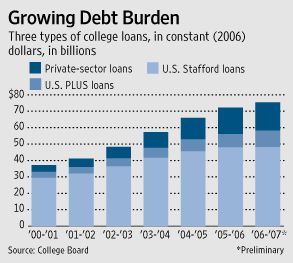Scott’s recent post (at LGM) on college debt, which links to a depressing New York Times story, focuses primarily on politics. The narrative has gotten pretty familiar. State education cutbacks force tuitions up. Students take out greater debt to pay for a post-secondary degree. Republicans plead budgetary pressure, but do so while gleefully reducing the tax burden on wealthy Americans. It is certainly blood-boiling stuff.
Many of us, quite rightly, bemoan the shift away from citizenship preparation (i.e., a liberal-arts education) and toward college as vocational training. We don’t think our primary job is to give our students “marketable skills.” But how can we best help our students under these circumstances?
I don’t have any answers, but I worry that my profession is letting our students down.
Daniel H. Nexon is a Professor at Georgetown University, with a joint appointment in the Department of Government and the School of Foreign Service. His academic work focuses on international-relations theory, power politics, empires and hegemony, and international order. He has also written on the relationship between popular culture and world politics.
He has held fellowships at Stanford University's Center for International Security and Cooperation and at the Ohio State University's Mershon Center for International Studies. During 2009-2010 he worked in the U.S. Department of Defense as a Council on Foreign Relations International Affairs Fellow. He was the lead editor of International Studies Quarterly from 2014-2018.
He is the author of The Struggle for Power in Early Modern Europe: Religious Conflict, Dynastic Empires, and International Change (Princeton University Press, 2009), which won the International Security Studies Section (ISSS) Best Book Award for 2010, and co-author of Exit from Hegemony: The Unraveling of the American Global Order (Oxford University Press, 2020). His articles have appeared in a lot of places. He is the founder of the The Duck of Minerva, and also blogs at Lawyers, Guns and Money.



Hi Dan! It’s really unfortunate that while the government is cutting back on educational subsidies, they are reducing the tax burden on affluent Americans without any hesitation; in a way pushing the aspiring college students to assume more and more debt. But see, this is not a singular case. Most of the richest nations in the world are doing exactly the same in order to back them monetarily while the elections take place.
But what I believe, an increase in educational subsidies is not going to solve the problem at all. In that case, the government debt is going to increase. Moreover, the students will still face the oppression of debt burdens, though few in measure. The government either needs to strengthen the job market so that the students passing out instantly get jobs and repay their student loans, or invent some alternative channels to get education – like opening some more government colleges or universities.
Marc Brown
Financial Writer
https://www.ovlg.com/